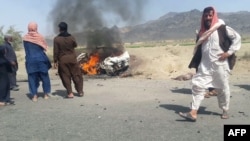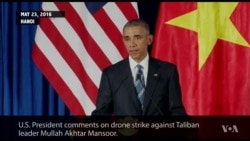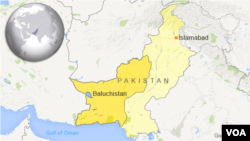A U.S. intelligence official says the death of Taliban chief Mullah Akhtar Mansoor may not make much of a difference, at least in the near term.
Despite being labeled as an imminent threat to U.S. forces and an "obstacle" to peace in Afghanistan, "There will be little battlefield impact," the official told VOA on the condition of anonymity. "The aggressive attacks expected as this fighting season begins are probably locked in."
The official also noted that while Mansoor's death gives the Taliban and its followers another chance to embrace peace talks with the Afghan government, reconciliation is "a position that has failed to gain traction."
WATCH: President Obama speaks on death of Mullah Mansoor
U.S. President Barack Obama told reporters Monday in Hanoi that Mansoor's death "removed the leader of an organization that has continued to plot against and unleash attacks on American and coalition forces."
He said the Taliban leader had rejected efforts by the Afghan government "to seriously engage in peace talks and end the violence that has taken the lives of countless innocent Afghan men, women and children."
A Pentagon spokesman said Monday that Mansoor was killed because he represented a "specific imminent threat" to U.S. and coalition forces in Afghanistan.
The Afghan intelligence agency on Sunday confirmed Mansoor was killed in a U.S. airstrike in Pakistan near the Afghan border.
Pakistan said it was informed by the U.S. after the drone strike was carried out, but lashed out at Washington for violating its "sovereignty."
Taliban officials privately confirmed the death of their leader but are reluctant to be identified, saying any final determination will be made by the group's so-called Rahbari Shura, or leadership council.
The drone strike occurred Saturday in Dalbandin, Baluchistan, according to Afghan intelligence agency NDS.
It could be the first time U.S. drones are known to have targeted Taliban fighters inside Pakistan's Baluchistan province. All other known drone strikes inside Pakistan have occurred in the country's federally administered tribal areas, a semi-autonomous region along the Afghan border where Pakistan's military has battled militants for years.
The elimination of Mansoor could deal a critical blow to the Taliban, which has struggled with internal divisions over its leadership since July 2015, when the insurgent group announced its founder and first leader, Mullah Omar, had been dead for more than two years.
VOA's Ayesha Tanzeem and Jeff Seldin contributed to this report.
WATCH: Video from the scene of the drone strike
VOA Pentagon correspondent Carla Babb contributed to this report








